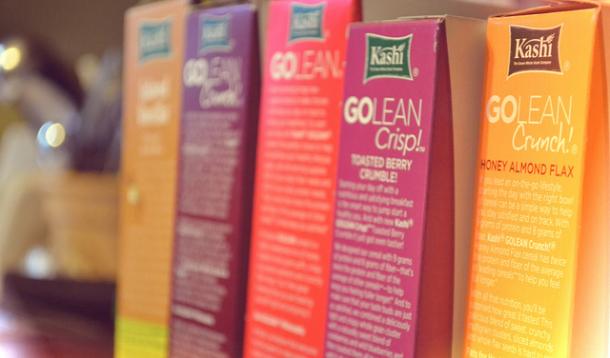
Everything about the Kellogg's Kashi brand screams "natural," from its name, to its packaging and marketing. Oh, not to mention that it says right on the front of many Kashi products "all-natural." One would assume that the ingredients going into Kashi products would be just that—natural. Apparently not. Recently, a photo was taken of a sign that was put up in a grocery store in Portsmouth, Rhode Island stating:
"You might be wondering where your favorite Kashi cereals have gone. It has recently come to our attention that 100% of the soy used in Kashi products is genetically modified, and that when the USDA tested the grains used there were found to be pesticides that are known carcinogens and hormone disruptors."
This is what prompted the Kashi Controversy.
Genetically Modified Organisms (GMO) foods, as defined by the World Health Organization (WHO) are "foods derived from organisms in which the genetic material (DNA) has been altered in a way that does not occur naturally." What's blatantly obvious here is that GMO foods are NOT all-natural. Sorry Kashi.
The purpose of growing genetically modified crops was initially to improve crop protection against common plant diseases caused by insects or viruses and for increased tolerance of herbicides. Because genetic modification of crops is a fairly new science, the long-term, potential harmful, health effects are unknown. Slightly scary.
Out of the 97 products that Kashi has listed on its website, only 7 of those products (cereals) contain the non-GMO verified seal and only 4 products are certified organic. Yet most of the products contain the "all-natural" claim. Deceiving? To most people, yes.
The sad truth is, that the claim "all-natural" means nothing. Nada. Zilch. Zip. It's an unregulated claim Kashi (and many other companies) use to justify jacking up their prices and to tug on the heartstrings of health-conscious consumers. Here is an interesting video that explains the difference between "natural" and "organic."
Kashi argues that more than 80% of crops grown in North America are grown using GMOs. They explain that because GMOs are not controlled well, and due to "pollen drift" from neighboring crops or contamination during shipping and storage of crops, it is likely that some Kashi products DO contain GMOs. Fair enough. But it seems like Kashi is making up excuses—they're not being 100% transparent about the ingredients that go into their products. Here's a video of Kashi's General Manager trying to cover his ass.
How do we know that Kashi products DO contain GMOs?
The Cornucopia Institute took a box of Kashi's Go Lean cereal off the shelf of a grocery store, sent it to an nationally accredited lab and had it tested. The result? The soy in this Kashi cereal DID contain 100% GMOs AND pesticide residues. Not cool Kashi.
Ok, to be fair to Kashi, its Non-GMO Project sounds promising. By 2014, Kashi promises that all of their "Go-Lean" cereals and Chewy granola bars will be free of GMOs (note: non-GMO foods don't necessarily mean organic). Also, I have yet to find another granola bar that contains as much protein and fibre and as little sugar as Kashi's Chewy granola bars. They actually make for an easy semi-healthy snack...if you don't mind the genetically modified and non-organic ingredients that is.
Part of Kashi's allure is that most of the products are fairly high in protein. This protein is mostly coming from soy. Soybeans are often highly contaminated with potentially harmful pesticides, fertilizers and other chemicals. That is why it's important to buy certified organic soy products whenever possible. To that end, I fault myself for not scouring the label well enough when buying Kashi products.
The bottom line—decide what is important for you and your family and read the label!
Don't be fooled by products that claim to be "all natural" or to have "all-natural ingredients." This does not mean that they are organic, free of genetic modification, or chemical-free. In fact, it doesn't mean anything. If eating organic, chemical- free foods is important to you (and within your budget), look for the USDA Organic symbol or the Canada Organic symbol on your foods or purchase foods that you know are produced organically at your local farmers market or straight from an organic farm. If all you want is to buy nutritious foods for your family, regardless if they are organic or not, avoid paying a premium price for "natural" products that may be identical to the generic and less expensive product right beside it.